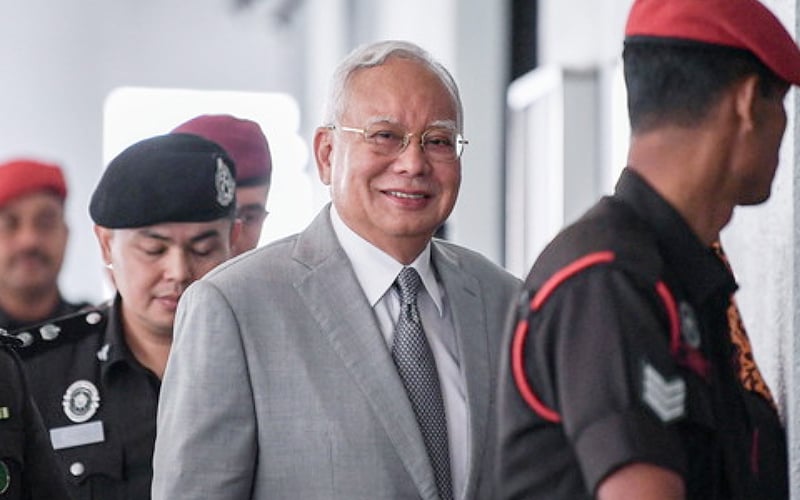
While many of us may still be pondering over our new year resolutions, former prime minister Najib Razak and his legal team are preparing for a discharge not amounting to an acquittal (DNAA) application for his criminal charges involving three counts of money laundering amounting to RM27 million in SRC International funds.
The request for a DNAA was made by Najib’s lead lawyer, Shafee Abdullah, and the court has fixed Jan 19 for deputy public prosecutor Ashrof Adrin Kamarul to respond.
On Jan 19, three possible scenarios may occur. First, the DPP rejects the request for a DNAA and proceeds with the trial. Second, the DPP rejects the request for a DNAA but is unable to proceed with the trial and asks for further adjournment. Third, the DPP accepts the request for a DNAA.
It would then be upon the court to determine what follows. The second and third scenarios may lead to the DNAA of Najib on all three counts of money laundering.
Unlike Ahmad Zahid Hamidi’s DNAA, where Zahid was discharged of all 47 corruption charges even though the prosecution had established a prima facie case with witnesses called and evidence tendered, here, the trial against Najib has not proceeded after four years. Shafee described it as “hanging over the former PM’s head like the sword of Damocles”.
In such circumstances, it is reasonable and indeed a normal practice for the defence team to request for a DNAA.
When asked by the judge, Ashrof explained that the trial had not proceeded as it was agreed that it should only commence after the other case involving RM47 million of SRC International funds is exhausted, thus providing Najib a justifiable ground to apply for a DNAA.
Earlier this year, Najib and 1MDB’s former CEO, Arul Kanda, were acquitted by the High Court on the charge of tampering with the auditor-general’s audit report on 1MDB.
The prosecution filed a notice of appeal but did not file the petition for appeal (which states the grounds of appeal) within the specified time frame. The prosecution also did not file and obtain a court order for extension of time. Thus, the Court of Appeal struck out the appeal and the acquittal stands as final judgment.
From the case of Zahid’s DNAA to the non-filing of the petition of appeal for Najib’s acquittal, to the delay in proceeding with the trial of the RM27 million SRC International case, the key seems to be with the public prosecutor.
As a public authority, on behalf of society and in public interest, prosecutors are tasked with the application of the law. They have a duty to prosecute and conduct the trial fairly and professionally, and assist the court to ensure that justice is done, which includes pursuing appeals when warranted. They carry a heavy responsibility and, thus, it is essential that their performance be above reproach.
This is why reforms to our public prosecution system are critical and urgent.
In the Malaysian context, the attorney-general (AG), who is a political appointee of the prime minister, acts as both the legal adviser to the government and public prosecutor (PP).
Under the constitution, the AG holds the discretion to institute, conduct or discontinue any proceeding for an offence. This is problematic in many aspects. The fusion of these two roles would inevitably open up a “channel” for executive interference on matters of criminal prosecution.
The role of the AG must be separated from the role and powers of the public prosecutor. Until and unless this is done, the prime minister cannot discard the responsibility of the influence and/or interference he has over the decisions of the public prosecutor, be it selective prosecution or effective impunity, as a direct result of his power to appoint the AG as PP.
The PP must therefore be a separate and independent institution that acts independently, akin to the judiciary. There should be measures to ensure that public prosecutors are able to carry out their professional duties and responsibilities without executive or other interference.
At the same time, there should also be oversight mechanisms to hold them accountable for the exercise of this discretion. Other areas to look into include the recruitment, promotion and transfer, disciplinary proceedings, training, and ethical duties of officers in the Attorney General’s Chambers (AGC) and the future institution of public prosecution. The reform on public prosecution is crucial for the administration of justice and rule of law.
It is commendable that the government recognises the importance of this reform, with law and institutional reform minister Azalina Othman Said announcing a three-phase plan. Civil society, including Bersih and Abim, have called for a clear roadmap to realise this reform agenda.
The possible DNAA on Najib’s corruption charge on Jan 19 is something we must not take lightly. Najib is implicated in the “mother of all corruption” -1MDB-related cases involving billions of ringgit.
Najib must not be allowed to escape the court process because of the technicality of delay. In the interest of justice, he must face a court of law and defend himself. This is the rule of law. - FMT
Ngeow Chow Ying is a practising lawyer and the convener of Project – Stability and Accountability for Malaysia (Projek SAMA).
The views expressed are those of the writer and do not necessarily reflect those of MMKtT.



No comments:
Post a Comment
Note: Only a member of this blog may post a comment.